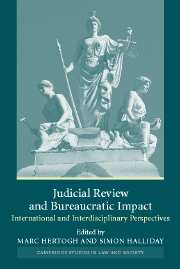Book contents
- Frontmatter
- Contents
- Acknowledgments
- Notes on the contributors
- Introduction
- Part One Conceptual and methodological issues
- Part Two International case studies
- Part Three The future of judicial review and bureaucratic impact
- 9 Judicial review and bureaucratic impact: the future of European Union administrative law
- 10 Judicial review and bureaucratic impact in future research
- Bibliography
- Index
9 - Judicial review and bureaucratic impact: the future of European Union administrative law
from Part Three - The future of judicial review and bureaucratic impact
Published online by Cambridge University Press: 29 July 2009
- Frontmatter
- Contents
- Acknowledgments
- Notes on the contributors
- Introduction
- Part One Conceptual and methodological issues
- Part Two International case studies
- Part Three The future of judicial review and bureaucratic impact
- 9 Judicial review and bureaucratic impact: the future of European Union administrative law
- 10 Judicial review and bureaucratic impact in future research
- Bibliography
- Index
Summary
In the last decade a number of words and phrases have become central to thinking about public policy making and implementation. They are ‘transparency’, ‘participation’, ‘governance’, ‘deliberation’, ‘network’, ‘epistemic community’ and ‘the new public management’. Taken together, what they represent is an erosion of the boundaries between the governors and the governed and a commitment to the belief that everyone and anyone with sufficient interest or knowledge should be incorporated into those public decision-making processes that result in decisions that affect them. These words and phrases are both empirical or positive and normative. They are believed both to describe what is happening in post-industrial democratic polities and to prescribe what should be happening. If they correctly describe either what is happening or our aspirations, they ought to have fairly clear implications for administrative law.
Beginning in the 1960s, there came to be a severe disjunction between both the actual administrative law and the scholarship about it in the United States and Europe. Earlier, on both sides of the Atlantic, administrative law had been essentially procedural and oriented to the individual. It dealt almost exclusively with the rules for how government officials must behave when either supplying or refusing to supply a benefit to or levying a sanction upon an individual. In the US, the law school course was often labelled administrative procedure, echoing the course in civil procedure and concentrating on what procedural rights individuals did or should enjoy in trial-type administrative hearings.
- Type
- Chapter
- Information
- Judicial Review and Bureaucratic ImpactInternational and Interdisciplinary Perspectives, pp. 251 - 268Publisher: Cambridge University PressPrint publication year: 2004



